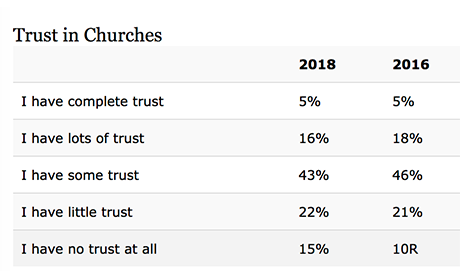A recent survey suggests that, in the last 2 years, New Zealanders’ trust in churches has continued to decline.
The same survey shows that the perceived change in personal trust in churches in the same period to be greater than the participants’ answers actually indicate.
The results indicate a score of 7 for reduced net trust. The perceived net reduced trust was scored 23.
The Colmar Brunton survey asked people how much they trust key groups such as government ministers, police, medical practitioners, churches, charities, small businesses, the media and bloggers.
The 2018 survey also scored charities as significantly less trustworthy than they were in 2016.
But when compared with 2016, New Zealanders are significantly more trusting of police, judges and courts, local government, government ministers and members of parliament.
Medical practitioners and police are perceived to be the most trustworthy.
The media, bloggers and online commentators are least trustworthy.
These results were obtained by a random survey of 1,000 New Zealanders aged 18 years and over.
They were interviewed online from 26 February to 4 March 2018.
In total, 472 respondents completed both the 2016 and 2018 surveys. The remaining respondents were new to the survey in 2018 and were randomly sourced from Colmar Brunton’s online panel and invited to take part.
The data also points to differences in overall trust levels across age groups, with older people being more trusting.
Of those aged 60 or older, 62 percent reported a high level of trust generally in people, compared with 38 percent high trust in the 18-29 year old group and 44 percent for those aged 30 to 59.
“It is unclear if we observe this pattern because people trust more as they age,” says researcher Dr Chapple, “or whether younger people today are generally less trusting than young people a generation ago. But overseas evidence suggests that trust levels may be falling in younger generations.”
[table “1” not found /]The survey was commissioned by the Institute for Governance and Policy Studies, and School of Government of Victoria University of Wellington.
Source
